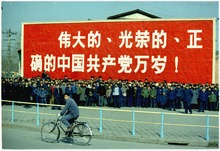Propaganda in the People's Republic of China
Propaganda in the People's Republic of China refers to the use of political propaganda by the Chinese Communist Party with the aim of influencing and re-educating domestic and international opinion about its politics in a positive sense . Domestically, it includes the censorship of anti-regime views, including in books and on the Internet , as well as the active cultivation of views that present the government in a favorable light.
history
20th century, Mao Zedong

The Chinese term xuānchuán ( 宣传 ) appears for the first time in the third century AD in the Chronicles of the Three Kingdoms in the meaning of "spreading, making known". In the early 20th century, the term was used to translate the Marxist-Leninist Russian term пропаганда ("propaganda").
Propaganda in China reached its greatest effectiveness during the 20th century with the help of the mass media and an authoritarian government. In his 1942 speech to a communist audience at the forum in Yan'an, Mao Zedong adopted the Soviet principle of agitprop for indoctrination and mobilization of the masses .
The television broadcaster China Central Television (CCTV) is traditionally in the service of national propaganda. In the area of print media, this task is carried out by People's Daily .
During the Cultural Revolution , propaganda played a prominent role in China's personality cult around Chairman Mao, including by making his words known . In previous years, the population was mobilized in mass appeals to take part in national campaigns such as the Great Leap Forward or the eradication of the four plagues . State-awarded labor heroes and soldiers such as Lei Feng , the civil war hero Dong Cunrui , the Korean war hero Yang Gensi , the agricultural politician Chen Yonggui and the Canadian doctor Norman Bethune were recommended as national models for imitation. While third world revolutionaries and allied states like Albania and North Korea were lauded, defamations of US imperialism and Soviet revisionism in the light of the Sino-Soviet rift were published at the same time . While the official propaganda flagged during this time, numerous unofficial, often critical publications were published under the name Dazibao ("posters with large characters ").
After Mao's death

After Mao's death in 1976, the members of the Gang of Four , which were held responsible for the excesses of the Cultural Revolution, were slandered with the help of propaganda . During the reform and opening-up policy initiated by Deng Xiaoping , advertising brochures for socialism with Chinese characteristics were distributed, and the market economy was promoted for the first time . The first campaign after Mao's death came in 1983 with the Campaign against Mental Pollution in China .
The events surrounding the Tian'anmen massacre of 1989 were seen by many older party members as an indication that liberalization in the propaganda area had been carried too far and that the party had to re-establish ideological and propagandistic control.
The 2008 Summer Olympics were portrayed by the government as a symbol of China's pride and global importance. At the same time, however, the Chinese milk scandal occurred , which was only reported to a higher level of administration a month later in order not to overshadow Olympic coverage.
After the human rights activist Liu Xiaobo received the Nobel Peace Prize in 2010, the Confucius Peace Prize was introduced as a competitive event in the same year .
In 2014, the CCP introduced an "ideological test" that all journalists must pass. You will be asked to refrain from making comments that conflict with the party line. In the same year, attempts to assimilate hundreds of thousands to millions of Uyghurs in Xinjiang re-education camps began.
The popular propaganda songs in China nationwide include Red Songs , especially the Hundred Patriotic Songs (recommended in 2009).
Individual evidence
- ↑ China: Ex-company boss admits guilt in the milk scandal. Spiegel Online , December 31, 2008, accessed August 9, 2018 .
- ↑ Serious flaws in the Chinese administrative system. Zeit Online , accessed August 9, 2018 .
- ↑ Chinese journalists have to pass an ideology exam (French) Le Figaro , December 13, 2013
literature
- Anne-Marie Brady, (2006). Guiding Hand: The Role of the CCP Central Propaganda Department in the Current Era , in: Westminster Papers in Communication and Culture. 1 (3): pp. 58-77.
- David Shambaugh: "China's Propaganda System: Institutions, Processes and Efficacy". China Journal, Jan. 2007 (57): pp. 25-58.
Web links
- China's Modern Authoritarianism Perry Link and Joshua Kurlantzick, in: The Wall Street Journal , May 25, 2009
